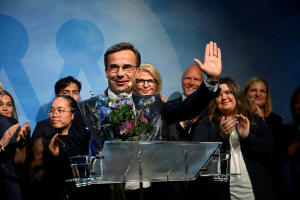Swedish voters hand anti-immigration Sweden Democrats influential role
 Send a link to a friend
Send a link to a friend
 [September 12, 2022]
By Johan Ahlander and Niklas Pollard [September 12, 2022]
By Johan Ahlander and Niklas Pollard
STOCKHOLM (Reuters) - Sweden's right bloc
appeared in pole position on Monday to form a government for the first
time in nearly a decade, helped by a wave of voter anger over gang
violence which could give an anti-immigration populist party a share in
power for the first time.
Sunday's national election remained too close to call on Monday with
about 5% of election districts yet to be counted, but early results gave
right-wing parties 175 of the 349 seats in the Riksdag, one more than
the left bloc.
Overseas postal ballots were still to be counted and while they have
historically tended to favour the right, this means a full preliminary
result is not due until Wednesday. All votes are then counted again to
provide a final tally.
If the results are confirmed, Sweden, which has long prided itself on
being a bastion of tolerance, will become less open to immigrants as the
Russian invasion of Ukraine continues to force people to flee and
climate change is pushing many to leave Africa.
Political observers say Moderate leader Ulf Kristersson is likely to
become prime minister in a minority government supported by the
anti-immigration Sweden Democrats who are poised to become the largest
party on the right and will have a big say on the new administration's
programme.

The party, which has white supremacists among its founders, is expected
to stay formally in opposition, however, with many voters and
politicians across the political spectrum uncomfortable with seeing it
in government.
"It is the Sweden Democrats who have driven the right-wing bloc along,
both in terms of shaping the political content and in attracting voters
to the constellation," the independent liberal newspaper Goteborgsposten
wrote.
"For Sweden, a new political era awaits."
What's unlikely to change is Sweden's path towards NATO membership,
which has broad support in the wake of Russia's actions in Ukraine, as
well as the country's plans to boost defence spending.
Andersson, who has yet to concede the election, pledged in March to
increase the military budget to 2% of gross domestic product in response
to a deteriorating security situation in Europe following what Moscow
calls its "special operation".
[to top of second column]
|

Moderate party leader Ulf Kristersson delivers a speach at the
Moderate party election watch at the Clarion Sign Hotel, in
Stockholm, Sweden, September 11, 2022.TT News Agency/Fredrik
Sandberg via REUTERS

GAINING STATURE
When Kristersson took over as leader of the Moderates in 2017, the
Sweden Democrats were shunned by the right and left. But he has
gradually deepened cross-party ties since a 2018 election loss and
the Sweden Democrats are increasingly seen as part of the mainstream
right having moderated some policies such as dropping plans to leave
the European Union.
Kristersson will now likely struggle to formulate his economic
agenda as inflation runs at its highest in about three decades and
energy costs are soaring, with the Sweden Democrats opposed to his
flagship policy plank of benefit cuts.
"Intense negotiations are expected and it might take time to form a
new government. Fiscal policy will likely remain expansionary
regardless of which side wins," Nordea Markets said in a note to
clients.
Preliminary results have showed the Sweden Democrats with 20.6% of
the vote, up from 17.5% in the previous election.
Campaigning had seen parties battle to be the toughest on gang
crime, after a steady rise in shootings that has unnerved voters,
while surging inflation and the energy crisis following the invasion
of Ukraine have increasingly taken centre-stage.
While law and order issues are home turf for the right, gathering
economic clouds as households and companies face sky-high power
prices had been seen boosting Andersson, viewed as a safe pair of
hands and more popular than her party.
"Personally I'm slightly disappointed and a confused, because we
haven't really got a result yet," said Mette, 50, a graphic
designer. "I was hoping for something different."
Andersson was finance minister for many years before becoming
Sweden's first female prime minister a year ago. Kristersson had
cast himself as the only candidate who could unite the right and
unseat her.
(Additional reporting by Janis Laizans and Isabella Ronca in
Stockholm and Gwladys Fouche in Oslo; writing by Justyna Pawlak;
Editing by Toby Chopra)
[© 2022 Thomson Reuters. All rights
reserved.]
This material may not be published,
broadcast, rewritten or redistributed.
Thompson Reuters is solely responsible for this content.
 |